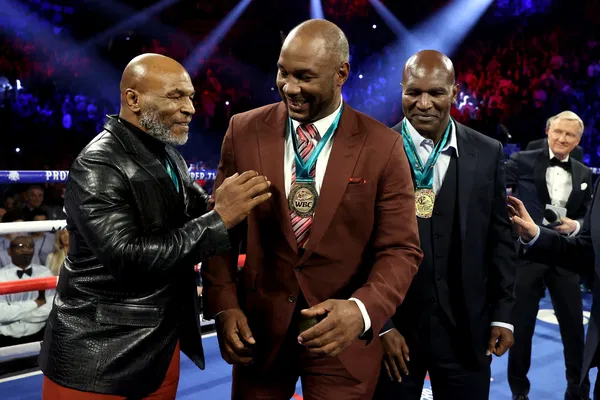An intriguing perspective has emerged regarding Lennox Lewis, the former heavyweight champion and Olympic gold medalist, questioning why he is often excluded from discussions about the top ten boxers of all time. Born to Jamaican parents, Lewis began his boxing journey at a young age and represented Canada in two Olympic Games. After securing a gold medal at the 1988 Seoul Olympics, he transitioned to the professional circuit in England, where his career spanned from 1989 to 2003.

During his illustrious career, Lewis faced some of the biggest names in boxing, including Evander Holyfield, Mike Tyson, Hasim Rahman, and Oliver McCall. His final fight in 2003 was a title defense against Vitali Klitschko, after which he retired. It wasn’t until 2022 that Oleksandr Usyk broke his record as an undisputed heavyweight champion. Despite these achievements, critics argue that Lewis’s career choices might have prevented him from being regarded as one of the all-time greats.
Why Lennox Lewis’s career approach draws criticism
View this post on Instagram
A social media personality recently suggested that Lewis’s choice of opponents played a significant role in why he’s often overlooked in discussions of boxing’s greatest. They argued that Lewis, who was older than many of his contemporaries, missed opportunities to fight the legends of his generation and instead faced a younger crop of boxers.
For instance, the content creator referenced Lewis’s fight against David Tua, pointing out that Tua belonged to a different generation. Another example was Chris Byrd, a former heavyweight champion, though Lewis and Byrd never actually faced each other. The criticism extended to Lewis’s fights against Holyfield and Tyson, both of whom were considered past their primes when they faced him.
The social media commentator argued that Lewis should have been competing against contemporaries such as Riddick Bowe, Tim Witherspoon, Alex Stewart, George Foreman, and a prime Tyson and Holyfield. Instead, they claimed Lewis’s fights often involved opponents from a subsequent generation, which were not as dynamic or accomplished as the boxers from his own era.
Missed opportunities and delayed clashes
The absence of a fight between Lennox Lewis and Riddick Bowe remains one of the sport’s great “what-ifs.” Similarly, the clashes with Holyfield and Tyson came too late in their careers to be considered iconic bouts. Holyfield was 37 years old when he fought Lewis in 1999, while Tyson was past his peak when they met in 2002. Critics argue that by the time these matches took place, both fighters were no longer at the height of their powers, diminishing the significance of the victories.
Counterarguments in favor of Lewis
While the critiques are notable, Lewis’s career also boasts many strong points. His professional journey began at age 23, a time when Tyson was already an established name in heavyweight boxing. It was reasonable for Lewis to take time to build his resume before facing the sport’s elite. Additionally, Lewis is celebrated for his resilience and ability to stage comebacks. After suffering losses to Oliver McCall and Hasim Rahman, Lewis redeemed himself by decisively defeating both in rematches, showcasing his ability to adapt and overcome adversity.
Moreover, Lewis’s accomplishments remain significant in the annals of heavyweight boxing. As the last undisputed heavyweight champion until Usyk, his achievements cemented his legacy, even if some critics argue his choice of opponents prevented him from reaching the very top tier of the sport.
A divisive debate
The debate over Lennox Lewis’s place among boxing’s all-time greats highlights the subjective nature of such rankings. While some argue that his career could have reached greater heights had he fought certain opponents, others maintain that his record, resilience, and longevity speak for themselves. Regardless of where he ranks, Lennox Lewis remains a towering figure in boxing history and a champion admired by fans and purists alike.
What’s your perspective? Did Lennox Lewis’s choice of opponents impact his legacy, or should his accomplishments stand on their own?